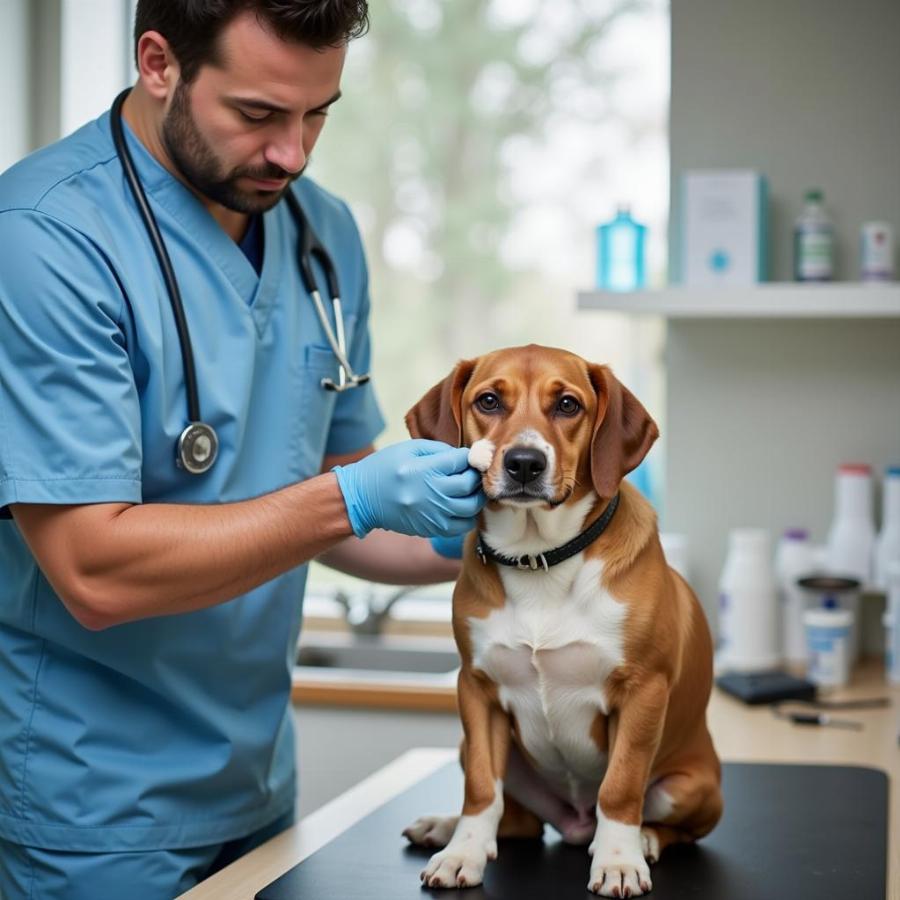Dog licking butthole, also known as anal licking, is a common behavior that can often leave owners puzzled and sometimes disgusted. While it might seem strange to us, this behavior isn’t always a cause for concern. Understanding why dogs engage in this behavior is key to determining when it’s a normal part of canine grooming and when it signals a potential health issue. This article will explore the reasons behind dog licking butthole, help you differentiate between normal and problematic licking, and provide guidance on when to seek veterinary attention.
Why Do Dogs Lick Their Buttholes?
There are several reasons why a dog might lick their butthole, ranging from basic hygiene to underlying medical conditions. Sometimes, it’s as simple as cleaning themselves, much like cats groom themselves. Dogs don’t have hands, so they rely on their tongues for grooming. Their anal glands, located near the butthole, release secretions that can have a strong odor, attracting the dog’s attention. Licking helps them keep this area clean and manage the scent. However, excessive licking can indicate a problem. Anal gland issues, such as impaction or infection, can cause discomfort and irritation, prompting the dog to lick excessively in an attempt to relieve the itchiness. Other potential causes include allergies, parasites, and even behavioral issues like anxiety or boredom.
Is Dog Licking Anus Normal?
Occasional dog licking anus is considered normal canine behavior. Dogs naturally clean themselves, and this includes the anal area. If your dog only licks occasionally and doesn’t show any other signs of discomfort or illness, there’s likely no need to worry. However, excessive and persistent licking can be a red flag. Pay attention to the frequency, intensity, and duration of the licking. Is it a quick lick now and then, or are they spending prolonged periods focused on the area? Are they scooting their bottom across the floor, another sign of anal gland issues? These observations will help you determine if the behavior is normal grooming or a sign of something more serious.
When to Worry About Dog Licking Butthole
While some licking is normal, there are several indicators that warrant a trip to the vet. If the licking is frequent, intense, or accompanied by other symptoms, it’s time to seek professional advice. These symptoms can include redness or swelling around the anus, a foul odor, scooting, or changes in bowel habits. Excessive licking can also lead to further irritation and even skin infections, making the problem worse. A veterinarian can diagnose the underlying cause, whether it’s impacted anal glands, allergies, parasites, or another condition, and recommend appropriate treatment. Don’t hesitate to contact your vet if you’re concerned about your dog’s licking. Early intervention can prevent more serious problems down the road.
What to Do If Your Dog is Licking Their Butthole Excessively?
If you notice your dog excessively licking their butthole, the first step is to observe their behavior closely. Note the frequency, intensity, and any accompanying symptoms. If the licking seems excessive or your dog appears uncomfortable, schedule an appointment with your veterinarian. Avoid trying to express your dog’s anal glands yourself unless you’ve been trained by a professional. Improper expression can cause injury. Why dogs lick paws can also be a sign of anxiety or allergies. Similarly, excessive licking of other areas, like the paws, can indicate underlying issues.
 Dog at the vet for an anal gland checkup
Dog at the vet for an anal gland checkup
Conclusion
Dog licking butthole is a common behavior that can be both normal and problematic. Understanding the reasons behind this behavior and recognizing the signs of potential health issues is crucial for responsible pet ownership. While occasional licking is a natural part of canine grooming, excessive and persistent licking can indicate underlying medical conditions like impacted anal glands, allergies, or parasites. If you’re concerned about your dog’s licking, consult your veterinarian for a proper diagnosis and treatment plan. By being attentive and proactive, you can ensure your furry friend’s health and well-being. Remember, dog licking anus shouldn’t be ignored, and addressing the underlying cause can significantly improve your dog’s comfort and quality of life.
FAQs
- Is it normal for a dog to lick its butthole after pooping? A quick lick after pooping can be normal, but prolonged licking might indicate an issue.
- How can I prevent my dog from licking its butthole? Addressing the underlying cause, such as impacted anal glands or allergies, is the most effective way to stop the licking.
- Can I express my dog’s anal glands myself? It’s best to leave this to a veterinarian or professional groomer to avoid potential injury.
- What are the signs of impacted anal glands? Scooting, excessive licking, a foul odor, and redness or swelling around the anus are common signs.
- What are the treatment options for impacted anal glands? Treatment can range from manual expression to medication or, in severe cases, surgery.
- Can diet affect anal gland health? A high-fiber diet can help regulate bowel movements and promote healthy anal gland function. You can find more information about suitable dog dewormer small dogs.
- Are certain dog breeds more prone to anal gland problems? Smaller dog breeds are often more susceptible to anal gland issues. If you are wondering why do dogs lick their buttholes, consult a veterinarian.
Further Reading
For more information on dog health and behavior, explore these related topics: Dog Anxiety, Allergies in Dogs, Parasite Prevention, and Canine Grooming.
Beaut Dogs is your trusted source for all things canine. We provide comprehensive information on dog breeds, care, health, and training. When you need expert advice, contact us at [email protected]. Beaut Dogs is committed to helping you provide the best possible care for your beloved companion. Visit us at https://beautdogs.com to learn more!